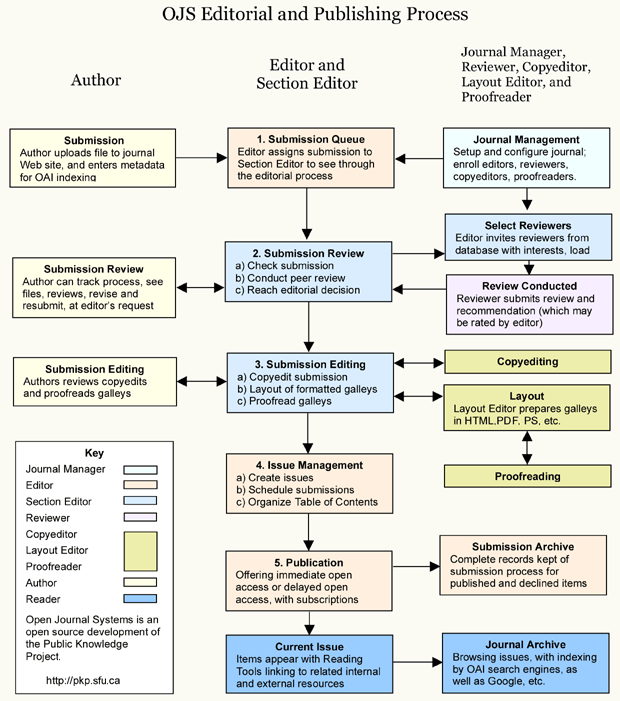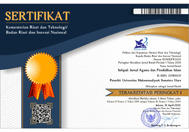- Focus and Scope
- Section Policies
- Peer Review Process
- Publication Frequency
- Open Access Policy
- Archiving
- Publication Ethics
- Plagiarism Policy
- Indexing
- References Management
- Correction and Retraction Policies
- Author Fees
Focus and Scope
Intiqad: Jurnal Agama dan Pendidikan Islam is a media publication manuscript that contains the results of the field research and literature studies in the field of Islamic Education applying peer-reviewed.
Manuscripts published in Intiqad: Jurnal Agama dan Pendidikan Islam focus on publishing articles that contain ideas, ideas, research results, and literature studies in the field of Islamic Education.
Intiqad: Jurnal Agama dan Pendidikan Islam covers the following topics:
- Al Quran and Hadith based Islamic Education
- History of Islamic Education
- Islamic Education Curriculum
- Islamic Religious Education Guidance and Counseling
- Issues about Islamic Education
- Management Of Islamic Religion Education
- Media and Learning Resources in Islamic Education
- Philosophy of Islamic Education
- Psychology of Islamic Education
- Research on Islamic Education
- Study of Islamic Education Figures
Section Policies
Articles
Peer Review Process
Intiqad: Jurnal Agama dan Pendidikan Islam implement each accepted manuscript will go through a review process by the Editor and reviewers, using a Double blind Peer-Review Process, which the reviewer does not know the identity of the author, and the author did not know the identity of the reviewer.
Intiqad: Jurnal Agama dan Pendidikan Islam implement policies Double Blind Peer-Review, every manuscript received will be sent to Reviewers who registered in The Intiqad: Jurnal Agama dan Pendidikan Islam. The review process lasts a maximum of up to 30 (thirty) days with the allocation of time given to each reviewer to complete its review process is a maximum of ten (10) working days. If the partners designated bestari previously not able to finish his review work within the time limit specified then chairman of the Chairman of Editorial Board will appoint a replacement to do a review Reviewers manuscript.
In the review process, reviewers provide considerations relating to compatibility between the title, abstract, introduction, discussion (results) and conclusion. In addition reviewer also give consideration associated with novelty, scientific impact and references used
Review Process:
- Author submit the manuscript
- Editor Evaluation [some manuscripts are rejected or returned before the review process]
- Double-blind peer review process
- Editor Decision (Acceptend Submission, Revisions Required, Resubmit For Review, Decline Submission)
- Confirmation to the authors
Final decision of articles acceptance will be made by Editors according to reviewers comments. Publication of accepted articles including the sequence of published articles will be made by Editor in Chief by considering sequence of accepted date and geographical distribution of authors.
EDITORIAL PROCESS

Publication Frequency
Intiqad: Jurnal agama dan Pendidikan Islam is a Journal published online on June and December.
Open Access Policy
Intiqad: Jurnal Agama dan Pendidikan Islam provides open access service, which means that all the content is available free of charge either person or institution can directly access this journal freely to the public that supports the exchange of global knowledge.
Users are allowed to read, download, copy, distribute, print, search, or link to the full text articles in this journal without asking for prior permission from the Publisher or author.
Archiving
This journal utilizes the LOCKSS system to create a distributed archiving system among participating libraries and permits those libraries to create permanent archives of the journal for purposes of preservation and restoration. More...
Publication Ethics
Intiqad: Jurnal Agama dan Pendidikan Islam follow the guidelines established by the Committee on Publication Ethics (Committee on Publication Ethics - COPE-) in all matters related to the ethics of publication., Intiqad: Jurnal Agama dan Pendidikan Islam adapting to meet the highest standards of ethics intended for editors, writers, and Reviewer. Publisher does not have the right to interfere with the integrity of the paper and is only responsible for publishing regularly and on time.
FOR EDITOR
- Editor Party Must ensure that writers follow the procedures/rules of writing in the Intiqad: Journal Agama dan Pendidikan Islam.
- The Editor can communicate with the Journal Manager, Editor, and Reviewer other in taking the Final Decision.
- Editors should refuse assignments when there is a possible conflict of interest
- The Editor must provide manuscripts assess objectively without seeing aspects of nationality, ethnicity, political affiliation, ethnicity, race, religion, gender, seniority, or institutional affiliation author.
- Editors should refuse assignments when there is a possible conflict of interes.
- Editors must ensure that the manuscript sent to reviewers do not contain information about the author, and vice versa.
- Decisions editors must be delivered to the author with responses Reviewer, except for responses that are personal or libelous.
- Editors should honor requests from writers who refuse individuals to evaluate manuscripts for reasons unacceptable.
- When the Editor finds or suspects Violation action writing and conflict authorship, editors can follow the guidelines in the flow diagram in resolving conflict COPE authorship.
- Editor and all staff must ensure the confidentiality of all the manuscripts received
FOR REVIEWER
- Reviewers are asked to provide an assessment of the substance of the manuscript in accordance with the Focus and Scope Journal and provide recommendations on assessment.
- Reviewers are asked to provide comments on the manuscript, if it is suspected find procedural mistakes of writing, publishing and publishing ethics
- Mitra Bestari can complete work on at a predetermined time and provide information to the editor if they are unable to meet the time limit specified.
- Reviewers must be able to be confidential manuscripts Author.
- Reviewers should not accept manuscripts for appraisal, if potential conflicts of interest, both individually and collaboratively with any institution.
- Reviewers should ask for consideration to the Editor on the similarity of substance or overlap between the manuscript under consideration or manuscript that was published more in common with Author Author or other.
- privileged information or ideas obtained through peer review must be kept confidential and not used for personal gain.
FOR AUTHORS
- The author must ensure that the manuscript is original and not plagiarism.
- The author must ensure that the manuscript has not been published previously and have never been assigned the rights to the article to the other party.
- The author ensures that manuscript Send tends to the work itself and follow the standard rules in accordance with the format quoting the appropriate reference.
- The author must ensure that the manuscript is original and does not engage in plagiarism or automatic plagiarism and Self-Plagiarism.
- Authors must follow the procedures established of Intiqad: Jurnal Agama dan Pendidikan Islam.
- The author does not send the manuscript together with the same topic and title to another journal.
- Authors should be able to provide information and make research data related details when the editor discovered the alleged doubts or falsification or plagiarism in the manuscripts. If the author finds any errors or inaccuracies that affect the manuscript which has been sent, the writer must promptly notify the Editor to immediately withdraw the manuscript writing and repairing.
- The author is not allowed to withdraw the article being reviewed by the reviewer before being restored by a Reviewer to the Editor.
Plagiarism Policy
Intiqad Jurnal Agama dan Pendidikan Islam state that plagiarism is not acceptable for all author and therefore establishes the following policy stating specific actions (penalties) when plagiarism is identified by plagiarism cheker software in an article that is submitted for publication. We are using Turnitin as the plagiarism checker software.
- Regardless of the source of the copied text or idea.
- Regardless of whether the author(s) of the text or idea which you have copied actually copied that text or idea from another source.
- Regardless of whether or not the authorship of the text or idea which you copy is known
- Regardless of the nature of your text (journal paper/article, web page, book chapter, paper submitted for a college course, etc) into which you copy the text or idea
- Regardless of whether or not the author of the source of the copied material gives permission for the material to be copied; and
- Regardless of whether you are or are not the author of the source of the copied text or idea (self-plagiarism).
The articles published in Intiqad Jurnal Agama dan Pendidikan Islam will be considered to retract in the publication if:
- they have clear evidence that the findings are unreliable, either as a result of misconduct (e.g. data fabrication) or honest error (e.g. miscalculation or experimental error)
- the findings have previously been published elsewhere without proper crossreferencing, permission or justification (i.e. cases of redundant publication)
- it constitutes plagiarism
- it reports unethical research
The mechanism of retraction follow the Retraction Guidelines of Committee on Publication Ethics (COPE) which can be accessed at https://publicationethics.org/files/retraction%20guidelines.pdf
Indexing
Intiqad Jurnal Agama dan Pendidikan Islam is abstracting & indexing in the following databases:
- Google Scholar
- Indonesia One Search
- Academic Resource Index
- BASE (Bielefeld Academic Search Engine)
- ORCID (Connecting Research and Researchers)
- PKP Index
- Journal Factor
- DRJI (Directory of Research Journals Indexing)
- Moraref
- Crossref
- Garuda (Garda Rujukan Digital)
- Sinta (Science and Technology Index)
- Dimensions
References Management
In writing Citation and Bibliography, Intiqad: Jurnal Pendidikan Islam uses the Mendeley Reference Management Software.
Correction and Retraction Policies
The papers published in the Intiqad Jurnal Agama dan Pendidikan Islam will be considered to retract in the publication if:
- They have clear evidence that the findings are unreliable, either as a result of misconduct (e.g. data fabrication) or honest error (e.g. miscalculation or experimental error)
- The findings have previously been published elsewhere without proper crossreferencing, permission or justification (i.e. cases of redundant publication)
- It constitutes plagiarism
- It reports unethical research
The mechanism of retraction follows the Retraction Guidelines of the Committee on Publication Ethics (COPE) which can be accessed at https://publicationethics.org/files/retraction%20guidelines.pdf.
Author Fees
This journal charges the following author fees.
Article Submission: 0.00 (IDR)
Article Publication: - (IDR) If the article is accepted for publication.

_(1).png)























